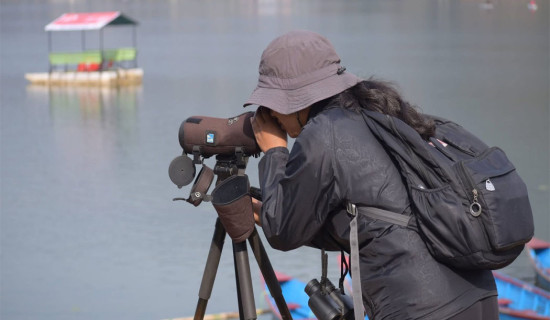- Wednesday, 14 January 2026
Verify Companies Before Making Commitments
On Tuesday, The Rising Nepal reported on a gang found involved in operating a fake office of the World Food Programme (WFP) at Budhanilkantha, Kathmandu. The gang had forged the UN organisation’s letterhead and stationery and was able to rent a building in a posh area of the national capital and call a tender through a national newspaper. This allowed it to swindle millions of rupees from unsuspecting victims who thought they were in business with the United Nations.
As per the report, the police have caught the thugs and an investigation is underway. Hopefully, the defrauded people will get their money back. This issue shows just how easy it has become to impersonate even big-name organisations. Cheats are getting ever bolder and have more tools at their disposal to deceive people. That is why the onus is on us, the citizens, to adequately verify the legitimacy of companies and officials before we enter any agreement with them.
And one of the fastest and easiest things we can do for this is to do an online search. Type in the person or company’s name on Google and see what pops up. Do a reverse image search of its logo or its representatives’ photo. Go to the news section and see what kind of press they have received. If they have a website, go through it thoroughly and see what it was created and what kind of content it has.
A legitimate company is likely to invest in a professional and well-designed online presence. So, if the website is shabby, the text has many spelling and grammatical errors, the photos are not of a reasonable quality or if there are many empty spaces and broken links, be suspicious and take a step back.
Also, check the website’s URL. Legitimate companies usually purchase domains (the text that comes after the www. in web addresses) that match their company name. For example, Gorkhapatra Corporation’s corporate website has the domain gorkhapatra.org.np.
In addition to the name, this address clarifies that it is an organisation (.org) in Nepal (.np) too. Beware of organisations that have the name XYZ but use websites that say ABC, or claim to be based in one country but have top-level domains of other nations, or do not use domains that match the nature of their work (colleges that do not use .edu, government agencies that do not use .gov etc).
Similarly, be cautious of domain names that include random numbers, misspellings and unusual combinations, or those that your web browser refuses to access for security reasons.
Furthermore, analyse the company and its supposed leaders’ social media presence. Check the type of content others have posted about them. Reach out to former employees. If the company and/or people you are in touch with claim to be part of a larger organisation, like the gang in the news that said they were working under the WFP, check the website and social media of the associated companies too. Better yet, contact them directly.
Call the parent company and ask them about the legitimacy of the entity you are looking to deal with. Ask them about the employment status of the people who have approached you. In the case presented in The Rising Nepal news, had the victims contacted the United Nations or the WFP office in Nepal, they would have found out that the office in Budhanilkantha was fake.
If the organisation claims to be a stand-alone venture not part of any conglomerate or a start-up, ask to see their registration certificates. In Nepal, every company needs to be registered with the Office of the Company Registrar (OCR). So, check if the organisation you seek to work with is. Enter their registration number in the OCR’s database to see if it is valid.
Additionally, if the company or its management claims to have industry-specific certifications or accreditations, verify these claims through relevant organisations. For example, if the company’s CEO claims to be a doctor, check their registration with the Nepal Medical Council.
Likewise, also verify addresses. If a company approaches you about renting a room or a building or its offices, ask where it was based before. Inquire about its previous landlord and contact them for a background check. Cross-reference that location with information from trusted sources like the municipality or Google Maps. Be suspicious if the company refuses to divulge details or gives vague and inconsistent answers. If the company proclaims that it has not had previous offices, ask why it chose your building and your location to be its first headquarters.
Finally, trust your instincts. If something feels off or too good to be true, it probably is. If you have doubts, it is better to err on the side of caution.














